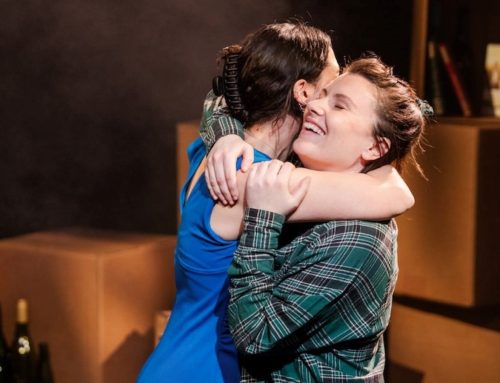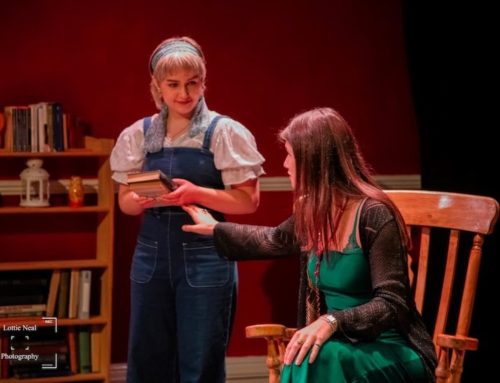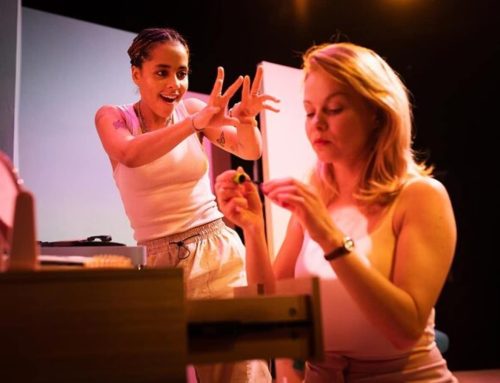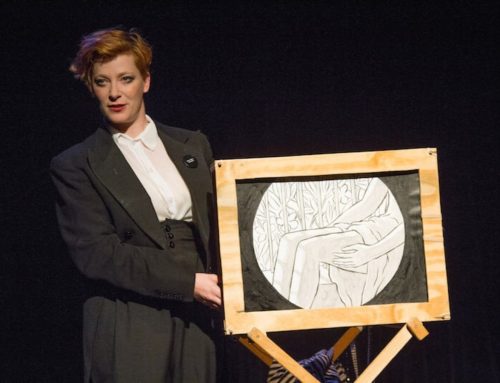Twenty-one year old Aaron Thakar’s immensely promising debut comedy Artificially Yours suggests he has read a fair few Alan Ayckbourn plays over the course of his short life. Impressively and immaculately structured, the action unfolds across two alternating narratives in three living rooms. Anticipate convergent deceptions, squabbling couples, misunderstandings, and carefully constructed coincidences in a form much resonant of the old master of dark farce. The show sidesteps most of the questions it poses about artificial intelligence and takes a while to get going. But this is a fine launchpad indeed for a new writer. Hannah McLeod’s pacey direction, packed with physical comedy, impresses too.
Pippa (Leslie Ash of Men Behaving Badly fame) and Martin (Paul Giddings) are recently divorced but still rowing on the sofa. Mostly the bickering is about when and if Martin should introduce their daughter Pippa to his new girlfriend Aerial, who looks like she is “in high school” and “wears leopard prints even a leopard wouldn’t”. Also in the mix is Pippa’s dishy new Italian squeeze Paulo (an unseen David Boyle) about whom Martin has decidedly mixed feelings, some of which approach jealousy.
Meanwhile in a living room in another part of town Lilah (Destiny Mayers on great form) is preparing her interview for a big promotion at her magazine. Her partner, jobbing actor Ash (Aaron Thakar again), dreams of landing a role as a TV detective. Failing that the actor would settle for a turn as a serial killer, so he may not have quite the level of ambition Lilah would like in a man.
Switch to a third lounge. Lilah’s competitive co-worker Ellie (Ella Jarvis who sparkles and also produces) is up for the same promotion. Her goofy, porn-addicted himbo boyfriend Noah (a show-stealing turn by a breathlessly self-confident Jake Mavis) has moved in after 8 weeks of dating. Neither of them are entirely sure it is the right choice. Noah’s addiction to porn (he only watches for the “fashion and interiors” he assures Ellie) is a source of on-going friction, as is the fact he will only ever cuddle after “bed sex” not “wall sex”. Adorably and irretrievably dumb, Noah thinks he has hit on a stonking new business idea: “protein powder you can smoke”. Perhaps things will turn out right in the end.
What connects the three couples is that they have invited a state-of-the-art couples’ therapy device called Agapē to mediate their relationships. A kind of resident AI agony aunt, Agapē sits centre stage throughout the show, blue lights whirling threateningly atop its sleek black frame. Katherine Moran is a great mimic, making Agapē about as close to Alexa as you can get without inviting an invitation from Amazon’s lawyers. The device listens, provides suggestions, and doles out sage advice to help smooth over frictions and spice up sex lives. Portentously it can also mimic voices, forecast squabbles, and correct grammar. It is also able to count how many times you masturbate, tell who you fancy and when you are lying.
“Trust love, trust happiness, trust Agapē” the hook line for the device’s ads tells us. But can you really trust an AI device that makes its own decisions, plays favourites, and has its own agenda to create the “optimal relationship solution”?
The show’s first act has a slow-burn 90’s sitcom vibe, offering up the kind of guilty schadenfreude one gets from seeing other people row on a train. Things sparkle briskly into life in act two when Lilah invites Ellie and her beau over for drinks, quesadillas, and competitive one-upmanship. The wine flows a little too freely. Secrets emerge over a game of truth or dare. Conflict erupts and unexpected connections are revealed. Meanwhile over at Pippa’s place Martin turns up with news about his girlfriend. Listening in to everything is the omnipresent and deeply ambiguous figure of Agapē, which may well be about to make some irreversible choices of its own.
Ultimately Thakar seems reluctant to make up his mind whether Agapē is a blessing or a curse. Perhaps that is simply a fair reflection of current opinion on the topic, and perhaps the answer is that it is both. The other central question – why none of the characters feels able to simply unplug the damn machine – also remains maddeningly unaddressed. This leaves Thakar focussing more on delivering frothy and enjoyable comedy than dealing with the moral complexities of artificial intelligence. But froth, this classy, this funny, from a 21-one-year old debut writer is impressive indeed. One suspects there is an awful lot more to come from this source.
Writer: Aaron Thakar
Director: Hannah McLeod
More Recent Reviews
Playfight. Soho Theatre.
Writer Julia Grogan’s breathtakingly assured debut play arrives at Soho Theatre following stellar reviews at the Edinburgh Fringe and [...]
All The Happy Things. Soho Theatre.
Naomi Denny’s three-hander comedy-drama All The Happy Things covers familiar themes within a recognisable premise. A grieving protagonist comes [...]
Telly. Bread and Roses Theatre.
The challenge with absurdist comedy is that many people do not find it funny. Laughing at the sheer weirdness [...]






